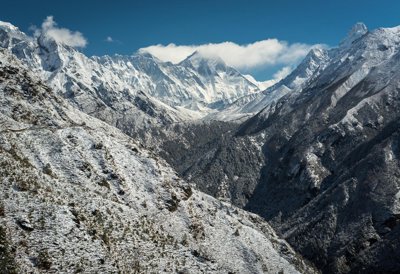How did you get to where you are now?
I come from a north Dublin working class background and have always had a love of, and innate skill for, mathematics and geography. Like many in the 1980’s the polytechnic system was my entry point into the technical professions and I studied at Dublin Institute of Technology (EU funded) before moving to London to work in heavy civil engineering.
I then moved to Gaza (Occupied Territories) to work for the UN which reignited my geography interests. We mapped refugee camps, mediated land disputes, organised land compensation, acquisition and ownership. That was when I started to understand the connection between land, geography and people, and the conflict that arises when land issues are not taken seriously. After nearly three years there, I returned to university in the late 1990s and then into the Royal Institution of Chartered Surveyors (RICS), a job that allows me to look closely at applied geography across a range of land issues.
What do you do as part of your role?
I am Director of Land and Resources within RICS. This is a global role and covers such diverse sectors as environment, geospatial surveying and mapping, rural land management and agriculture, development, valuation, planning, minerals extraction and telecoms.
A typical week can go from dealing with senior government policy makers, advising on technical standards, writing journal articles, speaking at events and dealing with the general public (I also deal with neighbour disputes). We have a team of experts too, so it’s not all me!
What skills and characteristics do you need for this role, apart from geographical knowledge?
Communication skills and the ability to think on your feet are important, as are people skills and soft skills such as mediation. Issues such as compulsory acquisition (taking someone’s land/property for infrastructure) and neighbour disputes can be harrowing, emotive experiences for people, so professional behaviour and a deep understanding of the ethos behind legislative processes is important.
How does geography feature in your work/what difference does it make?
Geography is a core feature to all our work, not just physical but also economic, political and social geography. I use geography in the classical sense when advising on say drone use, Ordnance Survey mapping or topographic survey specifications but I also use geography when understanding affordable housing provision, land use, sustainable development goals (SDGs) and the cost/value equation that drives all urban development and infrastructure provision.
What do you enjoy most about your job?
The diversity of it all and the amazing breadth of sectors that I can get involved with is what I enjoy most. We are doing a lot on unregistered land and property in developing countries and have just released a new global standard on land due diligence protocols for surveyors engaged in land acquisitions. This meant dealing with over 40 international and national bodies to barter a common global understanding of a complex problem and even brought me back to the UN. It used up all of my diplomatic skillsets and patience but it is pro-poor, gender sensitive and robust enough to deal with tribal/communal/refugee rights – quite revolutionary for the land and property professions and I’m delighted it’s done.
Do you get to travel for your role?
Yes, mainly to speak at international conferences such as the World Bank Land Conference in Washington DC and FIG Hanoi Vietnam 2019.
What are the opportunities for career progression? What might you be doing in five years’ time?
Land and property are expanding sectors and land management is critical for issues such as climate action, achievement of the SDGs and economic development. Career progression can happen quickly, who can tell what will happen in five years but I will still be a chartered geographer, that’s for sure.
What advice would you give to someone wanting to go in to this career?
Think on how your geography skills can be applied to a range of land and property sectors. The big firms (JLL, CBRE, DeLoitte, NY, PWC, Savills, Cluttons etc.) all offer very attractive graduate packages and are looking for well rounded professionals who can apply themselves to a range of, often geospatial/GIS data driven, issues. Geographers make perfect general practice surveyors (after a bit of specialist training). Also, do learn a language – in this case a coding language like Python.
How do you maintain your knowledge and interest in geography outside of work?
Lots of travel (Mexico this summer), a never-ending diet of documentaries, and a love of great travel writing (Chatwin, Gelhorn, Thesiger, Dalrymple for example).
Why did you choose geography? Why should others choose geography?
As someone far more intelligent than me once said ‘geography is the perfect combination of physical and intellectual activity’. It brings almost everything together and can act as a wonderful educational framework to understand the world in which we live and ultimately depend upon.
* This interview was undertaken in 2019 and was correct at the time of publication. Please note that the featured individual may no longer be in role, but the profile has been kept for career pathway and informational purposes.
James Kavanagh
Job title: Director of Land and Resources
Organisation: Royal Institution of Chartered Surveyors
Location: London, UK

